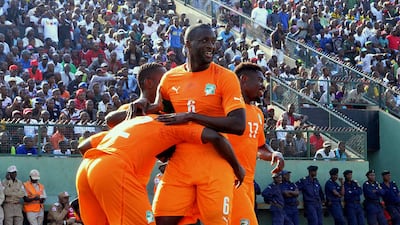The African Cup of Nations is in danger of being defined as a battle against the uncommitted.
Its 30th edition begins tomorrow after some of the usual pre-event tussling by clubs in football’s centre of power, Europe, over player availability and under a larger than usual cloud of uncertainty about the readiness of the venue.
It is not new for the designated host of a Cup of Nations to pass on the duty to another country, yet to do so just nine weeks before the opening ceremony is unprecedented.
The hope is that, from tomorrow’s kick off in Bata, Equatorial Guinea, events on the field will capture attention and make a global TV audience glance away from the competing attractions of high-profile European leagues and an Asian Cup.
But the challenges are considerable. Equatorial Guinea, a nation tucked under the chin of West Africa and with a population of less than 700,000, has taken on a heavy responsibility in putting together the jamboree on such short notice.
“To accept taking on a tournament like this in just two months, you can only be a true African,” said Issa Hayatou, the president of the Confederation of Africa Football (CAF) in November.
He was speaking with a smile of huge relief. Morocco were supposed to stage it, using sites of the past two Fifa World Club Cup tournaments.
The North African country then withdrew, citing concerns about the spread of Ebola, the virus that has killed at least 8,000 Africans and continues to menace the people of Guinea, Liberia and Sierra Leone.
Morocco’s arguments for not taking on the responsibility can look patchy. But their posture left CAF in crisis.
Hayatou’s gratitude to the Equatoguinean government is understandable. The fact that government has a poor human rights record is something his organisation are willing to look beyond.
Nor did CAF consider it an obstacle to giving Equatorial Guinea joint hosting rights for 2012, in which investments in facilities in Bata and Malabo, two of the cities being used for the 2015 tournament, have been paid off unexpectedly.
Put bluntly, CAF cannot afford to be too picky about the governments with which they make alliances.
Africa has limited resources to pump into big events and, while there is enthusiasm for them, there is restricted capacity.
The last Nations Cup was also staged by a stand-in host, South Africa taking over when Libya pulled out.
This all has an effect on the football.
Logistical problems are the enemy of peak performance, while coaches and players have concerns about how rapidly-laid pitches in Ebebiyin and Mongomo might play, as do spectators wanting to appreciate pass-and-move football, and the fine touch of performers such as Gervinho of Ivory Coast, Sofiane Feghouli of Algeria, or Jonathan Pitroipa of Al Jazira and Burkina Faso.
A Nations Cup is remembered, and celebrated, for longest when the most skilful players thrive.
Also read: Group-by-group team preview
Africa needs a memorable tournament. In truth, standards of entertainment in the competition have not been consistently high in the past three or four editions.
This one will be missing the country that set the continent’s benchmark for the first decade of the 21st century, Egypt, as well as the reigning champions, Nigeria.
While there is something compelling about the fluid hierarchy of the African game, where upstarts such as Burkina Faso, finalists in 2013, or minnows like Cape Verde, rise as suddenly as Pharaohs trip up and Super Eagles plunge, there is a sense of stagnation, too.
Africa is blessed to have a player such as Yaya Toure committed to the Cup of Nations even though he could be towering over the Premier League with Manchester City.
The continent’s favourite sport, though, would feel fresher if a few, younger stars could properly challenge Toure for the status of the continent’s No 1.
Last week, he collected the African Footballer of the Year award for a fourth time in a row.
Toure would happily swap them all for the title he craves most of all: a Nations Cup.
Twice a losing finalist, he and his Ivory Coast compatriots start among the strongest favourites. They will be wary of Cameroon in the group phase and of whoever comes out of a fierce Group C, where Asamoah Gyan’s Ghana lurk, along with Senegal and an Algeria side galvanised by a good World Cup in Brazil.
From that half of the draw, a winner seems likeliest to emerge, having kept their composure through the extra logistical complexities of an event chasing daunting deadlines.
sports@thenational.ae
Follow us on Twitter at SprtNationalUAE


